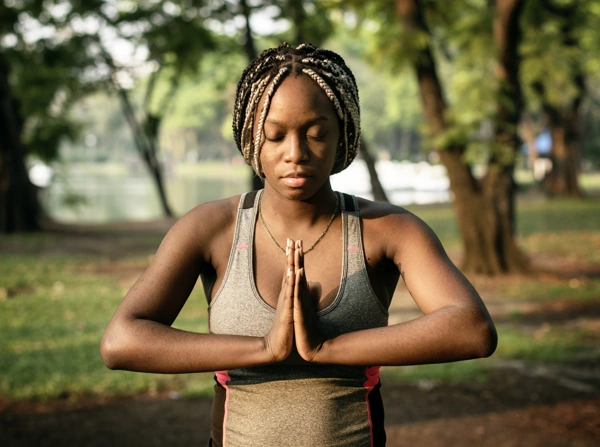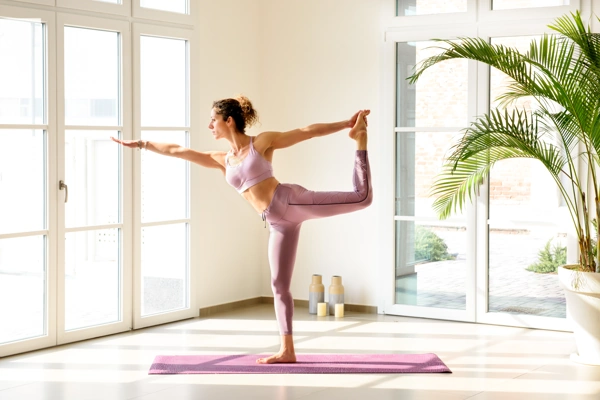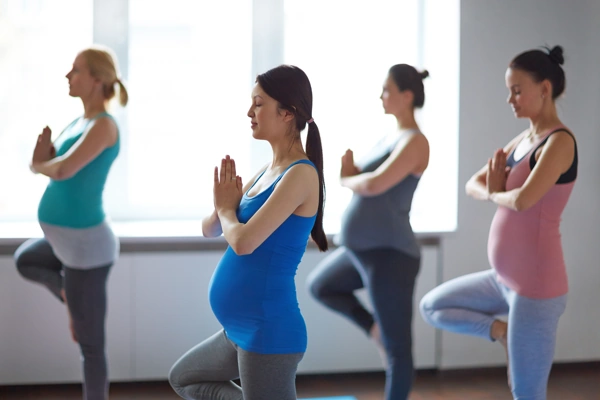Many high-performing athletes use yoga to enhance both mental and physical performance. Incorporating mindfulness into their workouts can help them manage anxiety and stress better, which is especially helpful in sports where there is a high stakes element that requires them to perform under duress.
Are there tangible benefits of yoga for athletes? Yes, as there are some yoga practices that increase circulation to muscles and reduce lactic acid buildup during muscle contraction, which help athletes recover more rapidly. Let’s look at a few more of the benefits of yoga for athletes.

Increased Flexibility
Yoga helps athletes increase flexibility by relieving muscle tension that builds up over time. This makes exercise easier and may prevent injuries.
Yoga also has the added advantage of helping athletes reduce stress. Many athletes become overwhelmed by all the hard work they put into their sports. Yoga can help athletes relax and focus on what matters most: improving performance in competition.
Yoga can reduce stress levels by requiring concentration, meditation and deep breathing. This helps athletes focus on the present moment while decreasing cortisol levels.
Athletes can also build their core muscles through yoga poses that require a strong core. These muscles are essential for protecting joints and the spine.
Yoga requires almost every movement you perform to build core strength, helping prevent back injuries and keeping your body fit for the long haul.
Increased Strength
No matter if you’re an athlete, runner, swimmer or just enjoy movement, practicing yoga is an excellent way to build strength in your body and improve balance and flexibility. Yoga offers several advantages over other forms of exercise like developing a strong core and increasing flexibility; plus it improves balance too!
Why athletes like LeBron James and Blake Griffin regularly practice yoga? Because it is an integral part of their overall training regiment and recovery process.
Research has demonstrated that just ten weeks of biweekly yoga sessions can significantly enhance an athlete’s range of motion in their joints and decrease the likelihood of injuries. Not only that, but it’s an ideal low-impact way to cross train.
Yoga also benefits athletes by expediting their recovery time after injury. This is especially helpful for athletes who must return to school, work, or play sports after being out of the game due to an injury.
Increased Mental Focus
High-performing athletes require mental clarity and focus, which is why many professional teams have implemented yoga into their training regimens. Studies have demonstrated that it can decrease stress, enhance focus, combat depression and ease anxiety levels.
Recent research revealed that practicing yoga for 10 weeks significantly increased concentration, body awareness and mental quiet in college athletes. This benefit was especially observed among endurance sports like runners or cyclists.
Yoga not only provides physical benefits such as improved strength and flexibility, but it can also help balance repetitive movements or a hectic schedule that may be creating stress in an athlete’s life.

Increased Balance
Yoga poses can help improve balance and coordination, increasing endurance and reducing the risk of injuries during exercise. Furthermore, they improve concentration which will enhance performance and enable you to train more effectively.
Most athletes are used to conditioning exercises that target muscle groups individually, often in a linear pattern that does not fully integrate their body into the movement. This reliance on isolation can result in weak or imbalanced areas which could lead to discomfort or injury.
how to incorporate yoga into your training routine
Find a Yoga Style That Works for You
There are many different styles of yoga, so it’s important to find one that works for you. If you’re looking for a more physically demanding practice, try power yoga or ashtanga yoga. If you’re looking for a more relaxing practice, try yin yoga or restorative yoga.
Practice Yoga Consistently
Like any other form of exercise, consistency is key when it comes to yoga. Make sure to practice regularly, even if it’s just for a few minutes a day. The more you practice, the more benefits you’ll see.
Listen to Your Body
It’s important to listen to your body when practicing yoga. If a pose feels uncomfortable or painful, stop and modify the pose or skip it altogether. The goal of yoga is to create a mind-body connection, not to push yourself to the limit.
Conclusion
High-performing athletes are turning to yoga for strength and improved athletic performance. From professional footballers like Lebron James and Ray Lewis, to Olympic gold medalists Evelyn Stevens and Rebecca Soni, many athletes now include yoga into their training regimens as a key component of success.
Indeed, yoga for athletes is a unique practice that offers a range of physical and mental benefits, from improved flexibility and balance to reduced stress and improved focus.
If you’re an athlete looking to take your performance to the next level, consider incorporating yoga into your training routine. With consistency and dedication, you can unlock your full potential and become the best athlete you can be.
FAQ’s
Can yoga really improve athletic performance?
Yes, yoga has been shown to have a number of physical and mental benefits that can improve athletic performance. Improved flexibility, balance, strength, endurance, and reduced stress and improved focus are just a few of the benefits of yoga for athletes.
How often should I practice yoga as an athlete?
The frequency of your yoga practice will depend on your schedule and goals. As a general rule, aim to practice yoga at least 2-3 times a week for optimal results. You can also incorporate yoga into your warm-up or cool-down routine for added benefits.
Is yoga safe for athletes with existing injuries?
Yes, yoga can be safe for athletes with existing injuries, as long as they modify poses as needed and listen to their body. It’s always best to consult with a doctor or physical therapist before starting any new exercise program, especially if you have a pre-existing injury.
Can yoga help prevent injuries in athletes?
Yes, by improving flexibility, balance, and stability, yoga can help to reduce the risk of injury in athletes. In addition, the mind-body connection developed through yoga can help athletes become more aware of their bodies and avoid overuse injuries. Regular yoga practice can be a valuable addition to any athlete’s injury prevention strategy.






